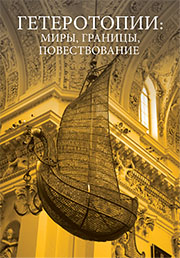Гетеротопии истории и гетеротопии наррации (Роман Л. Улицкой Даниэль Штайн, переводчик)
Historical and narrative heterotopias. Daniel Stein, Translator, a novel by Lyudmila Ulitskaya
Author(s): Tünde SzabóSubject(s): Semiotics / Semiology, Russian Literature, Transformation Period (1990 - 2010), Theory of Literature
Published by: Vilniaus Universiteto Leidykla
Summary/Abstract: The first part of the study examines the theoretical issue of to what extent M. Foucault’s principles of heterotopia can be applied to the literary work as such. The analysis shows that all six of the principles which Foucault defined are valid for literary works if, on the basis of Y. Lotman’s semiosphere theory, they are interpreted as semiotic space. The second part is an analysis of L. Ulitskaya’s novel from the perspective of textual heterotopias as constructing blocks of the narrative and as historical elements that appear throughout the life of the hero. The starting point of L. Ultitskaya’s novel both from the point of view of the plot and the narrative consists in two historical heterotopias: the ghetto and the partisans’ camp. On the narrative level of the novel certain text types (e. g. report to the police, coming out note, noticeboard, advertisement, prayer, etc.) that can be termed as heterotopias when compared to traditional narratives play a fundamental role.
Journal: Literatūra
- Issue Year: 57/2015
- Issue No: 5
- Page Range: 316-324
- Page Count: 9
- Language: Russian

